I have, in essays past, referred to Xander Harris as one of the most controversial characters in Buffy the Vampire Slayer. After spending more time in the current fandom landscape, I need to correct that statement. He’s simply one of the most disliked characters in Buffy the Vampire Slayer. A lot of people hate him, and given his appearances up until now, it’s not entirely difficult to see why. Xander is an archetypical example of what I will call the Mild Nerd Guy; a trope born out of the 1980s and its Revenge Of The Nerds-led championing of geek culture. A trope that unfortunately came to dominate genre television throughout the 1990s and 2000s.
This is a character who is defined in opposition to more typical Dashing Action Hero archetypes. Where the Action Hero is strong and muscle-bound, the Mild Nerd Guy is physically weedy. He is often shy and lacking in self-confidence. He will appear creepy when he means to be charming – but in an innocent way that encourages us to feel sympathy with this helplessly befuddled young man. He has interests coded as “nerdy” – comic books, science, maths, Dungeons and Dragons. He will be unsuccessful with women, and more often than not will concentrate all his sexual energy onto a single desired target: a popular and attractive woman. This woman will – at least at the beginning of the story – neglects his silent pining in favour of clearly undeserving Bad Boys and Popular Jocks. This is where you get is your Scott Pilgrims, your Ross Gellers, your Tom Hansens, your Every Character Anthony Michael Hall Ever Played… and yes, your Xander Harrises.
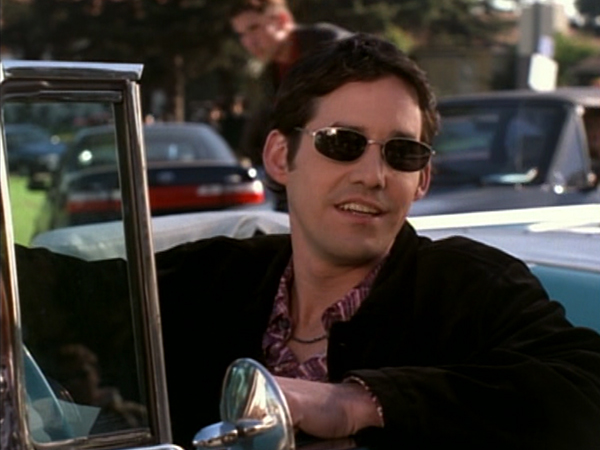
In essence, the Mild Nerd Guy is an alternate model of masculinity, one that certain types of men (shy, nerdy, physically weak) may relate to more than the Dashing Action Hero archetype. Unfortunately, while the trope often presents these men as more respectful towards women than their counterparts, the reality is that female autonomy is a secondary concern in both cases. These are competing models that men can use to Earn Women. Neither is actually concerned with the desires and goals of the women involved at all.
The Mild Nerd Guy has obvious parallels to the sociological concept of the Nice Guy, a term that most in feminist circles should be comfortably au fait with by now. The Nice Guy feels deserving of the attentions of women solely because of his lack of overt hostility towards them, and resents them when this “niceness” is not immediately rewarded with sexual favours. While the two concepts should not be conflated – one is a writing trope while the other is a social phenomenon – they are inextricably linked. Media informs the way we interact with the world, and the world informs the way we interact with media. Male entitlement engorges itself with stories of men winning women through inaction – the implication being that men deserve the attentions of women by default, and should be upset when it is not automatically bestowed upon them.
Meanwhile, women who have firsthand experience of this entitlement and the behaviour it encourages will naturally be fed up with it, and will bring that frustration into their consumption of media. They will take one look at a Scott Pilgrim or Xander Harris and be immediately, justifiably repulsed. While the more fantastical crimes of Angel or Spike can be easily forgiven, everyday crimes cannot. Most women have never met a serial killer. We’ve all met a creepy nerd.
This is not a criticism of viewers who have reacted in that way. The common accusation of Xander being a “Nice Guy” I believe an inaccurate read on his character and a misuse of a term meant for the analysis of reality and not fiction. However, I can’t blame anyone who makes that instinctive leap. In fact I would say that bringing one’s own experiences to the consumption of media is the only correct way to watch television. And yet, I can’t count myself truly among that crowd. Despite my distaste for the simpering entitlement this trope has encouraged in male nerd circles, and despite the times I have been disgusted by a line Nicholas Brendon has been made to deliver thus far, I can’t say that I don’t like Xander. In fact, I would say I like Xander, and this episode is a big reason why.
This episode is quietly a turning point for Xander’s character. More than that, it’s quietly one of the best and most unique episodes in the series. Most of Buffy’s most famous episodes are one of two things: emotional showstopper finales (Becoming, The Gift), or experimental concept episodes (Once More With Feeling, Hush). The Zeppo counts among the latter, though it wears its concept more subtly than the others on this list. You cannot watch Once More With Feeling and believe that you are not watching a musical episode. You can however watch The Zeppo and believe that you are watching an episode of Buffy the Vampire Slayer. This would be a mistake. This is, in fact, an episode of Xander the Zombie Fighter, inside which occurs an episode of Buffy the Vampire Slayer.
The Zeppo places a greater emphasis on POV than perhaps any other episode, and this is further highlighted by the fact that, unlike 99% of the show, this episode is not told from Buffy’s point of view, but from Xander’s. It’s all Xander, even from the pre-credits scene, in which he doesn’t even appear until the very end. This sequence is base-form Buffy, as we watch Buffy and her friends take down a generically evil demon hell-bent on destroying the world. Willow, Giles, Faith, and Buffy herself all play key roles in this fight, as each of them has skills specifically useful to a Buffy fight scene. Xander does not, and so he is absent. This scene tells us what we are about to watch – not Xander as the focus of a Buffy episode, but an episode about Xander’s alienation from his own show. We watch Xander flitting around the fringes of a Buffy the Vampire Slayer episode, trying desperately to get in.
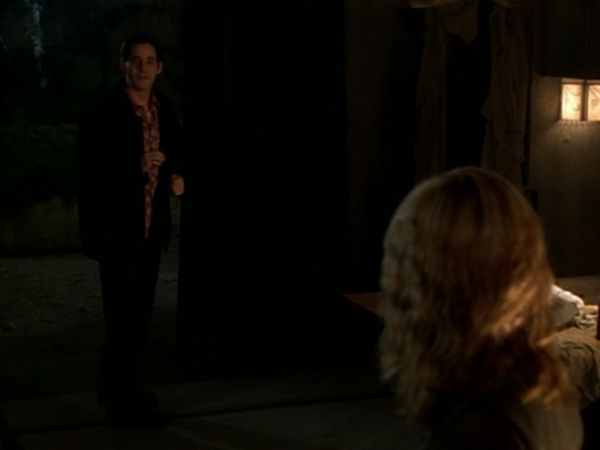
Let’s talk about the episode of Buffy happening here. We are only shown glimpses of it through Xander, and so we only have a few snapshots to go on. What we can gather is that there is a group of demons who want to end the world by opening the Hellmouth. Willow seems to be able to prevent it through some kind of binding spell. Angel is key to the process for unspecified reasons, and his sacrifice is required to save the day. It resembles an episode composed on auto-pilot, cobbled together from aspects shaved off superior episodes. The Hellmouth demon from Prophecy Girl returns, and Angel’s sacrifice being key to the process is ripped directly from Becoming. The phallic monster being defeated in the library even evokes Graduation Day, as does Buffy giving Faith advice (“Faith! Go for the heart!”) that she will return to Buffy later (“Want to know the key? Human weakness. Everyone has it, even him.”).
This is an episode so predictable and bare-bones you could almost call it boring, which is very much the point. It’s simple enough for us to be able to just about follow it through Xander’s eyes, but kept at enough distance to prevent us from actually enjoying it. We want to understand what’s going on as much as Xander does, but like Xander, we are refused. We are reduced to coming in at the end of scenes, receiving contextless titbits, or, in the episode’s funniest moment, actively interrupting melodrama. We get to see Buffy and Angel at their most histrionic, exchanging passionate pleas as mournful strings rise in the background – at which point, Xander arrives. The scene stops. The music stops dead. We watch him attempt to ask a question as Buffy and Angel stare at him in silence and near-stillness, until Xander is done, at which point the strings and melodrama resume. It’s as if he had pressed pause on the tape just long enough to make an awkward interjection. It’s one of the finest meta jokes in the series, and demonstrative of how this episode wants us to feel: like we are watching an episode inside another episode.
In the opening scene of Teacher’s Pet, we peeked inside Xander’s head to see a fantasy in which he is the star of Buffy the Vampire Slayer, casually punching out vampires and winning a swooning girl. Given that Buffy exists to subvert the overwhelmingly dominance of men in the superheroic genre, this is neither a desirable fantasy to us nor a particularly sympathetic view of Xander. By this episode though, he has somewhat let that desire go. He merely wants to be in Buffy the Vampire Slayer. Helpless directly compared Buffy to Superman – a comparison that has been made before since Never Kill A Boy On The First Date – and The Zeppo follows up on that by comparing Xander to Jimmy Olsen, Superman’s sidekick. He has accepted Buffy’s role as Hero, but is struggling to find his own role within the same genre structure.
“‘Integral part’ of the group? Xander, you’re the, the useless part of the group. You’re the Zeppo.”
Cordelia Chase, 3×13 The Zeppo
Xander’s struggle has clear roots in gendered anxieties, of men facing a world in which they are not required. While the powerful people most involved in physically battling the apocalypse are all women, the only young human man in the cast is functionally useless. Even the demons they’re fighting are all-female warriors known for consuming their foes after battle, much as Slayers apparently desire food (and as Faith proves in this episode, other things) after their own battles. Xander on the other hand is reduced to fetching food for these more powerful people. This itself is coded as a feminine role – the archetypal Mother, the provider. When Xander declares his need to find “his thing”, this is as much a penis metaphor as the car itself is. He is attempting to find his manhood in a world designed to emasculate him.
Jack O’Toole, Xander’s nemesis for this episode, represents an opposition to this emasculation. He is violent, dangerous, intimidating, and, as Cordelia points out, “cool”, in a way that Xander is simply not. He represents a strange kind of aspiration for Xander, but also a threat. Even undead, he’s still more schoolyard bully than horrific monster, but that makes him a more direct danger to Xander, as he can impose emasculation directly onto him. This emasculation is coded homo-erotically, in an Ancient-Greece sense. O’Toole threatens to “take” Xander, grabs him from behind, holds up a penetrative object and asks him where he “wants it”. Xander’s immediate insistence that he and Jack were “rasslin’, but not in a gay way” stems from his intertwined fear of emasculation and homosexuality.
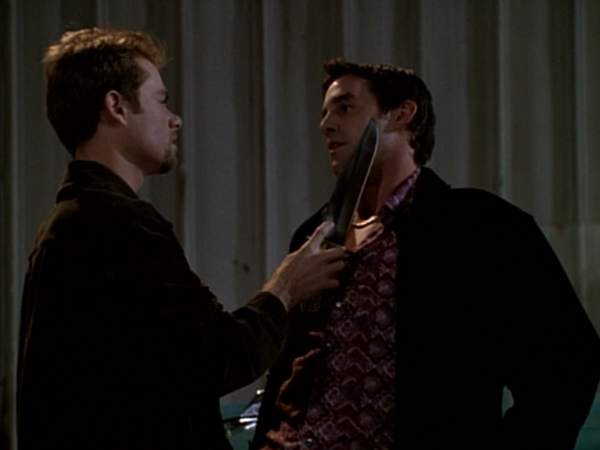
So Xander attempts to perform masculinity. He tries to play football and thinks about learning guitar. He gets a car and attempts to pick up women with it. He hangs out with a gang of boisterous men. He even achieves the supposed pinnacle of successful masculinity – losing his virginity to an attractive woman.He is even successful in most of these endeavours. His new car instantly attracts a woman, who desperately wants to go for a ride with him in it. He helps Faith win a fight and has sex afterwards. He is accepted by a male friend group and invited into their inner circle. Despite his fears of emasculation, Xander actually proves himself somewhat capable of performing successful masculinity. His “thing” – metaphorical and otherwise – does work.
And it doesn’t make him remotely happy. He realises instantly that he doesn’t care one bit about cars, and is bored stiff by the woman said car attracts, to the point that he is even excited to see Angel. He has sex, yes – but despite his clear desire for post-coital tenderness, he is unceremoniously kicked out of the motel room half-naked, in a clear subversion of supposed typical gender dynamics. He is invited into a male friend group, but in order to do this he has to die – the exact fate that his female friends are excluding him from his current ‘gang’ in order to save him from. This whole episode is an exercise in “be careful what you wish for”, in which Xander achieves successful masculinity, and has a terrible time because of it.
“Great! I wanna be in the gang, sure! What do I gotta do?”
Xander Harris and Jack O’Toole, 3×13 The Zeppo
“You gotta die.”
“Xander’s out of this. He nearly got killed last time we fought. This whole thing will be easier if we know he’s safe.”
Buffy Summers, 3×13 The Zeppo
Xander simply doesn’t belong in the main heroic arena. There is no room for the dashing, wise-cracking male action hero that he wishes he could be, because Buffy is already the dashing wise-cracking action hero. For him to “join the gang” in the way that Faith or Willow have would inevitably result in his death, because the show does not have capacity for him to exist in that way. He must be a different kind of character.
So where does this leave our non-hero? A lesser show might have had Xander come in at the last minute and save the gang from the apocalypse, proving his heroism and worth to the group, but that’s not the point that the episode comes to. Rather, the rest of the Scoobies are proved correct in excluding him. They successfully stop the apocalypse, and Xander is kept safe. No, if Xander is to survive he must resist his fruitless desire to be the centre of attention. He must accept his role in the shadows.
In one beautiful cut at the climax, we leave behind the chaos of lights and noise and battle that the Scoobies are engaged in, directly into silence, as Jack and Xander face off over an imminently explosive bomb. Jack’s desire to blow up the school is borne from a petulant, pointless, and extremely masculine desire to cause destruction for destruction’s sake, to prove his own manhood through indiscriminate bloodshed. Xander’s insecurities may evoke incel culture in some ways, but it’s Jack who embodies the most dangerous aspect of that culture: the way in which it inspires horrific acts of violence.
This episode aired less than 90 days before the Columbine High School massacre, an event that interrupts the airing of this very season of television. Perhaps the biggest impact of this event, beyond its immediate horror, is how it became the blueprint for so many similar acts of violence from frustrated young men. A model of American terrorism, based in male entitlement, was being born right here, in this year.
So despite the way in which Xander echoes incel culture, here is is actually put in opposition to it. He wins, not by performing a more successful version of Jack’s masculinity, but by admitting his own vulnerabilities. Jack believes himself immortal, and desires an act of brutality to enshrine this immortality, but Xander embraces his own human weakness. It’s not just that he’s ready to die – it’s that he is ready to die ingloriously. He’s prepared to be blown to meaningless smithereens for reasons nobody is likely to understand or admire him for. He steps out of the spotlight, and embraces the quiet.
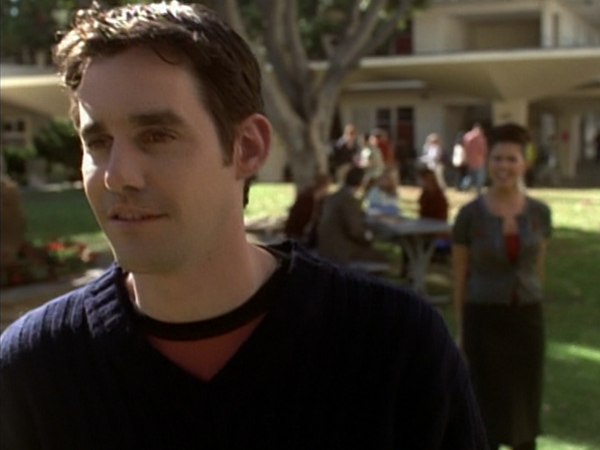
This is the role that brings out the best in Xander, and that his finest moments as a character come from. It’s this acceptance that allows him to be a source of strength for Buffy in a way that he frankly wasn’t before. He learns to prop up and embolden Buffy. Rather than resenting her strength, he learns to extol it (see The Freshman, I Was Made To Love You, Dirty Girls). His willingness to die rather than fight back saves his life here, but along with love it saves the entire world in Grave. He is taking up the role of The Heart of Animus. It’s a feminine archetype that he is coming to not only embrace, but flourish in.
As the dust settles on this episode, and the rest of the Scoobies sit nursing their post-battle wounds, Xander comes to meet them, and shows his growth by refusing to advertise it. He does not brag about his night in some vain attempt at glory, in the way that the Xander of season one might have. Instead, he offers to get them all snacks. He accepts his role as provider of food and emotional support. He accepts the power of his own femininity. He is able to walk away from Cordelia, untouched by her barbs, because he no longer needs to prove his masculinity. Gradually, he is starting to break free of such gendered expectations. He’s found his “thing”, and it’s not a penis metaphor at all. It’s something more powerful; more feminine. It’s strength in the shadows; in the secret spaces; in the quiet.
* * *
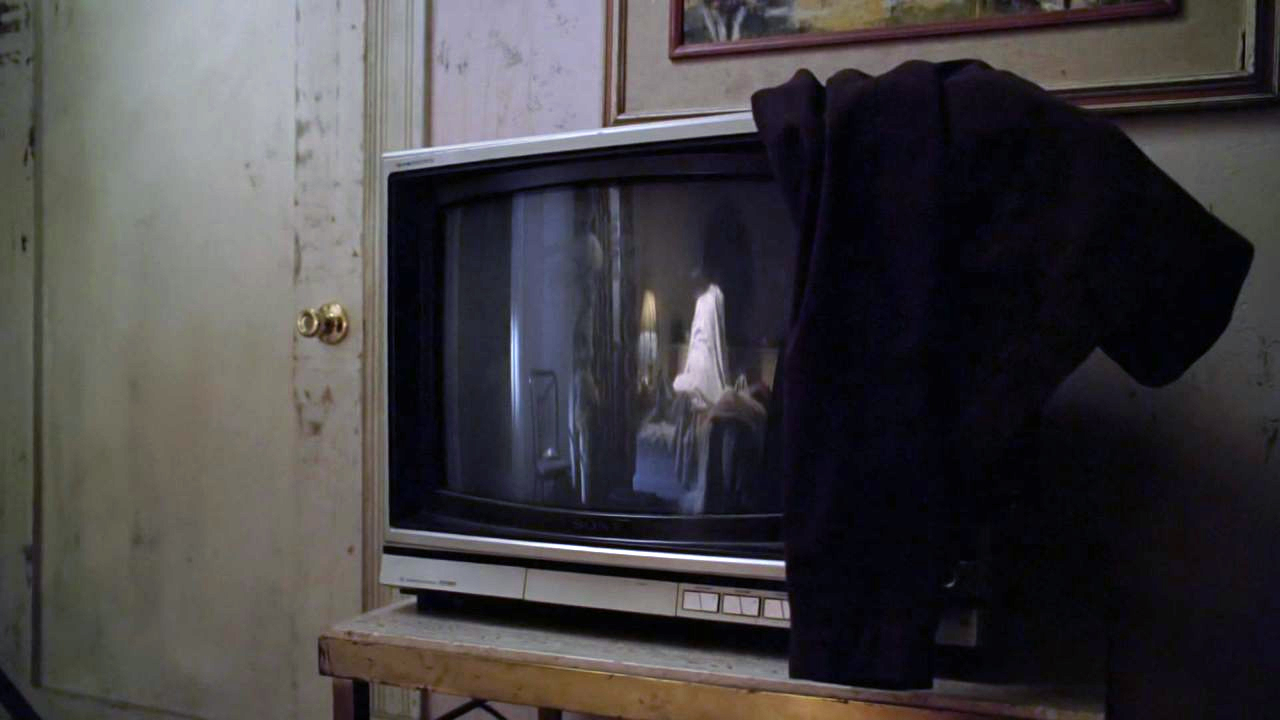
Love this, it’s so beautifully written. I think I am among few who also really like aspects of Xander’s character (I have some obvious criticisms too). But his relationship with masculinity and his ideas around sex/love are really interesting to me.
LikeLike
This legitimately made me view this episode completely differently. I (for the most part) don’t like Xander & his tendency to act as a Joss Whedon self-insert at times. But in this case I think my dislike of him clouded my ability to judge the purpose of this episode and what it was saying about Xander’s character. Thanks for making that clearer to me!
LikeLike